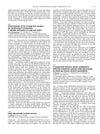 May 2015 in “Journal of The American Academy of Dermatology”
May 2015 in “Journal of The American Academy of Dermatology” There's a growing resistance to the antibiotic mupirocin in children's skin infections caused by MRSA in New York.
 10 citations,
July 2013 in “British Journal of Dermatology”
10 citations,
July 2013 in “British Journal of Dermatology” High MUC-18/MCAM levels in blood indicate a worse outlook for melanoma patients.
 12 citations,
June 2021 in “Scientific Reports”
12 citations,
June 2021 in “Scientific Reports” Curcumin may help reverse aging by targeting specific genes.
 May 2022 in “Maǧallaẗ Buḥūṯ Al-Tarbiyyaẗ Al-Nawʿiyyaẗ (Print)”
May 2022 in “Maǧallaẗ Buḥūṯ Al-Tarbiyyaẗ Al-Nawʿiyyaẗ (Print)” Eating a high inositol diet significantly improves insulin resistance and hormone levels in women with PCOS.
 7 citations,
July 2013 in “British Journal of Dermatology”
7 citations,
July 2013 in “British Journal of Dermatology” No genetic link between prostaglandins and hair loss found.
 March 2024 in “PLoS medicine”
March 2024 in “PLoS medicine” Physical activity, height, and smoking affect prostate cancer risk.
3 citations,
October 2020 in “Arthritis Care & Research” New tools and criteria have been developed to better assess and treat pediatric lupus.
 20 citations,
June 2010 in “Genes and Immunity”
20 citations,
June 2010 in “Genes and Immunity” Blood tests can help understand the genetic differences in people with alopecia areata, including how severe it is and if it's inherited.
 142 citations,
January 2019 in “Frontiers in Neuroendocrinology”
142 citations,
January 2019 in “Frontiers in Neuroendocrinology” Postpartum depression is linked to changes in brain chemicals, inflammation, stress, and certain genes, and can potentially be identified by markers like specific steroids, serotonin levels, and vitamin D levels.
41 citations,
February 2021 in “Translational research” Non-coding RNAs could help detect and treat radiation damage.
218 citations,
September 2012 in “Gastroenterology” Colorectal cancer development involves both genetic changes and epigenetic alterations like DNA methylation and microRNA changes.
 December 2024 in “Journal of the International Society of Sports Nutrition”
December 2024 in “Journal of the International Society of Sports Nutrition” Creatine monohydrate is safe and effective for muscle recovery and performance, especially for those with low creatine levels.
 2 citations,
July 2007 in “Cancer biology & therapy”
2 citations,
July 2007 in “Cancer biology & therapy” Bexxar is highly effective as a first treatment for non-Hodgkin's lymphoma, with most patients alive and many in remission after eight years.
 May 2023 in “Animal Reproduction Update”
May 2023 in “Animal Reproduction Update” High levels of cortisol in hair show long-term stress which can lower fertility in animals.
 1 citations,
May 2023 in “Frontiers in endocrinology”
1 citations,
May 2023 in “Frontiers in endocrinology” A new MBTPS2 gene variant disrupts fat metabolism and collagen production, causing Osteogenesis imperfecta.
 1 citations,
June 2014 in “Toxicologie analytique et clinique/Annales de toxicologie analytique”
1 citations,
June 2014 in “Toxicologie analytique et clinique/Annales de toxicologie analytique” Body hair can be used to test for alcohol intake, especially in men.
 37 citations,
October 2021 in “Nutrients”
37 citations,
October 2021 in “Nutrients” Vitamin D might help regulate insulin in the body, but taking Vitamin D supplements doesn't clearly prevent or improve type 2 diabetes. More research is needed.
11 citations,
April 2020 in “Animals” Moving horses to new places can increase their stress levels, as shown by higher stress hormone in their hair.
4 citations,
January 2020 in “Skin appendage disorders” Toxic metals can cause hair loss and should be considered by doctors.
 April 2024 in “Frontiers in microbiology”
April 2024 in “Frontiers in microbiology” Certain gut bacteria may increase or decrease the risk of male pattern baldness.
23 citations,
June 2019 in “Bioanalysis” Monitoring steroid hormones in blood can better detect testosterone doping.

Blood cell counts could help predict and treat alopecia areata and telogen effluvium.
 70 citations,
April 2016 in “Experimental Dermatology”
70 citations,
April 2016 in “Experimental Dermatology” A patient with alopecia areata regrew hair after taking tofacitinib and showed changes in certain blood and skin markers.
 September 2024 in “Journal of Bioscience and Applied Research/Journal of Bioscience and Applied Research ”
September 2024 in “Journal of Bioscience and Applied Research/Journal of Bioscience and Applied Research ” COVID-19 can cause hair loss due to stress, with inflammation markers like D-dimer levels playing a role.

No single biomarker is reliable enough for diagnosing and assessing SLE.
August 2020 in “Benha Journal of Applied Sciences” Higher NLR, PLR, and MPV may help diagnose androgenetic alopecia.
11 citations,
January 2016 in “BMC veterinary research” Urinary Se to creatinine ratio, serum Se, and glutathione peroxidase are effective early biomarkers for selenium status in dogs.
 7 citations,
June 2021 in “Amino acids”
7 citations,
June 2021 in “Amino acids” Human hair protein modifications could potentially indicate heart disease risk.
January 2014 in “Journal of Jilin University” Higher levels of certain immune cells and proteins are linked to more severe lupus symptoms.
 April 2024 in “Bioscience trends”
April 2024 in “Bioscience trends” Higher levels of certain DNAs in blood may indicate hair follicle damage in alopecia areata patients.




















